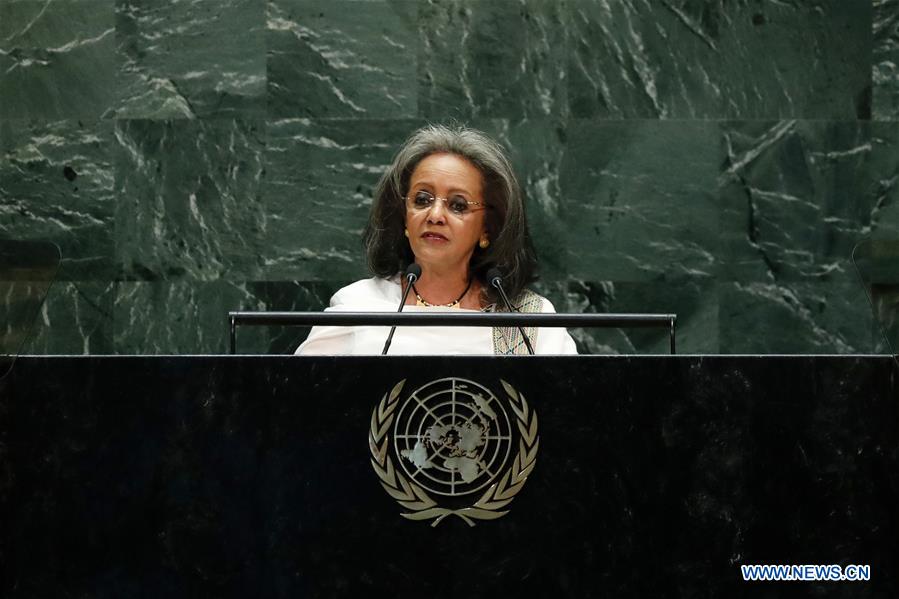
Ethiopian President Sahle-Work Zewde addresses the General Debate of the 74th session of the UN General Assembly at the UN headquarters in New York, on Sept. 26, 2019. (Xinhua/Li Muzi)
UNITED NATIONS, Sept. 26 (Xinhua) -- World leaders attending the ongoing General Debate of the 74th session of the United Nations General Assembly (UNGA 74) on Thursday underlined quality education and poverty eradication.
"Ensuring access to quality education means less child labor, less exploitation, fewer child marriages. It allows for increased political engagement and entrepreneurial and economic activity," said Ethiopian President Sahle-Work Zewde.
Speaking of the "Ethiopian Education Development Roadmap" that the country has just launched, Zewde said that the roadmap focuses on out-of-school children. "Many of these are from pastoralist or disadvantaged areas, groups with special needs, or the physically disabled."
"The roadmap provides for strengthening alternative modes of delivery. It focuses on girls, as they are still less likely to complete primary education, and on quality, addressing the barriers to education in the classroom or at home," said the president.
As to poverty, Zewde noted that Ethiopia's main aspiration is to "move our people out of poverty."
"We are striving to provide a dignified life for all our citizens. The central element of our vision for sustainable development includes building infrastructure and harnessing our national resources," the president said.
"The grim reality, however, is that today nearly 65 million Ethiopians do not have access to electricity. And, the construction of the Grand Ethiopian Renaissance Dam on the Blue Nile is merely to generate hydro-electric power to offer our people an opportunity, at least, to have supper with a light-on," Zewde said.
President of Sao Tome and Principe Evaristo Carvalho said that poverty is "the greatest scourge" of humanity, and it is no coincidence that the eradication of it appears as the first Sustainable Development Goal.
"The eradication of it, in all its forms and dimensions, should be the first priority in the concert of nations, namely the United Nations," said the president.
"Poverty is a major cause of hunger, land degradation, unbridled exploitation of natural resources, armed conflict, population displacement, saturation of major urban centers, migratory flows from South to North, with tragic consequences," he added.
There are millions of children who cannot access "quality" education everywhere in the least developed countries, said Malawian President Peter Mutharika.
"Education creates a human society that understands its problems and equips the people with the capacity to solve their problems. Investing in education is the best way of investing in all other sectors of society," the president noted.
"That is why in Malawi, education gets the lion's share of the national budget every year," he said.
The president expressed his appreciation to the support from various stakeholders, but stressed that "the global commitment on education is weakening."
UN's latest report "informs that that millions of children are still out of school. Worse enough, not all who attend school are learning," he added.
"These educational gaps also threaten an individual's ability to move out of poverty. Failing to prepare the youth is preparing a generation to fail," the president added.
Nauru's new president Lionel Aingimea said that the lack of good job opportunities that require a diploma has led some families "to question the value of a quality education."
"Therefore, I will be calling for a review of the education system in Nauru to address the challenges and issues that we face, with a view to put in place, quality education system that will provide all learners, young and old, with capabilities to become economically productive, develop sustainable livelihoods and enhance individual wellbeing," said the president.
"But most importantly, the curriculum will embrace the Nauruan language, cultures, and traditions," the president noted.
Noting that eradicating poverty and improving the way of life revolves around the development of sustainable energy supplies, the president said that the importation of fossil fuels is "a massive drain on our national coffers."
"Therefore, I am pleased to announce that much progress has been made in reaching our target of generating 50 percent of our energy from solar by 2020. This is an incredible feat for our small island," he said, obviously linking poverty eradication to climate, a sizzling topic during the UNGA high-level week.
The General Debate of UNGA 74 opened Tuesday at the UN headquarters in New York with the theme of "Galvanizing multilateral efforts for poverty eradication, quality education, climate action and inclusion."















